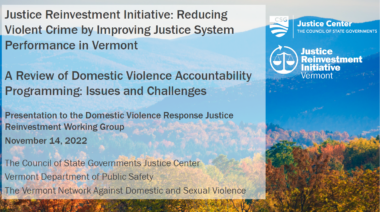
Explainer: Key Findings from Vermont’s Domestic Violence Justice Reinvestment Initiative
For decades, Vermont has made a concerted effort to support victims, protect communities, and emphasize accountability in cases of domestic violence. However, domestic violence continues to be a persistent problem in the state. Between 2010 and 2020, domestic violence crimes accounted for an increasing proportion of all felony cases and a consistent proportion of all misdemeanor cases. Additionally, substantial data challenges and gaps limit the full understanding of domestic violence prevalence in the state.
Concerned by these ongoing trends, Vermont leaders began using a bipartisan, interbranch Justice Reinvestment Initiative (JRI) approach in 2020 to assess and improve the state’s responses to domestic violence.
Between March 2021 and December 2023, CSG Justice Center staff, in partnership with the Vermont State Police and the Vermont Network Against Domestic Violence (Vermont Network), used Sequential Intercept Mapping to analyze responses to domestic violence at five intercepts: community services, law enforcement, initial detention and court hearings, systems responses, and reentry and community supervision. Sequential Intercept Mapping, adapted from the Sequential Intercept Model, allows agencies to assess their resources, opportunities, and gaps across the criminal justice system.
Over the course of the project, CSG Justice Center staff presented key findings to the Executive Working Group overseeing the work:
- Intercept 0: Community Services. Vermont Network and community advocates work with an average of over 8,000 domestic violence victims and survivors annually, with intimate partner violence being the most common victimization experience.
-
- Certain communities, including women and individuals who are Black, Indigenous, or other People of Color; LGBTQ+; or have disabilities are at heightened risks for violence.
- Advocates reported struggling to meet the needs of victims and survivors, particularly for housing and transportation.
-
- Stakeholders noted a need for improved intra- and interagency communication to better support victims and survivors, as well as domestic violence education in the broader community.
- Intercept 1: Law enforcement and Child Welfare. On average, 1,300 domestic violence incidents are reported to Vermont law enforcement annually, with physical injury and the presence of weapons being common.
-
- Women between the ages of 18 and 44 were most impacted.
- There are disparities in training among law enforcement officers, 911 call-takers, dispatchers, and Department for Children and Families (DCF) workers, as well as challenges in coordinating community responses to meet the diverse needs of victims and survivors.
- Intercept 2: Initial Detention and Court. On average, nearly three-quarters of felony domestic violence cases and over half of misdemeanor cases result in a conviction, as do a majority of emergency temporary restraining orders and about 50 percent of final restraining orders.
-
- Stakeholders highlighted a need for improved, consistent training on domestic violence; more clarity about the court’s processes for responding to domestic violence; barriers for demographically specific populations, including individuals who are Deaf, Hard of Hearing, or who do not speak English as their first language; and a disconnect between victims’ and survivors’ desires and available court responses.
- Intercept 3: Community Interventions. Individuals who have been victimized by or who have committed domestic violence often face co-occurring issues of mental health and/or substance use and seek services in the community.
-
- Findings highlighted constrained funding and resources for community interventions, challenges related to safety and responsivity, inconsistent domestic violence education and training practices, and gaps in data collection.
- Intercept 3: Domestic Violence Accountability Programming (DVAPs): DVAP, a part of Intercept 3: Community Interventions, addresses intervention and accountability needs for people who commit harm in intimate partner relationships. Due to the importance of DVAPs as a community intervention for domestic violence, these programs were examined separately from other community interventions, such as mental health or substance use service provision.
-
- Over 200 individuals were referred to DVAP between June 2021 and September 2022, with most individuals successfully completing programming.
-
- Findings detailed historical disinvestment, an aging workforce delivering programming, varied methods of interacting with and assessing clients, gaps in data collection and reporting, and a lack of resources to support programming specific to levels of risk and need or culturally responsive programming.
- Intercept 4: Corrections and Reentry. About a quarter of people sentenced to prison in Vermont between 2016 and 2020 and 20 to 25 percent of people on community supervision were convicted of domestic violence or a related crime.
-
- Stakeholders report issues of limitations in current data collection practices, gaps in victim notification, varying assessment tools, a lack of formalized domestic violence training for Department of Corrections employees, and a need for gender- and risk-responsive programming.
In late spring, the Executive Working Group will review and discuss the CSG Justice Center’s recommendations to improve the state’s domestic violence responses and decide which ones to adopt for implementation and measurement.
This project was supported by Grant No. 2020-ZB-BX-0019 awarded by the Bureau of Justice Assistance. The Bureau of Justice Assistance is a component of the Department of Justice’s Office of Justice Programs, which also includes the Bureau of Justice Statistics, the National Institute of Justice, the Office of Juvenile Justice and Delinquency Prevention, the Office for Victims of Crime, and the SMART Office. Points of view or opinions in this document are those of the author and do not necessarily represent the official position or policies of the U.S. Department of Justice.
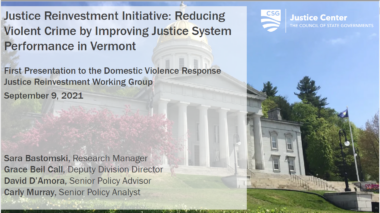
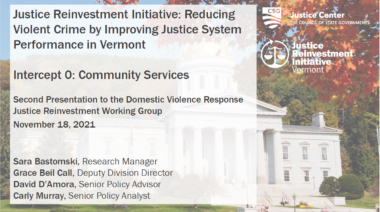
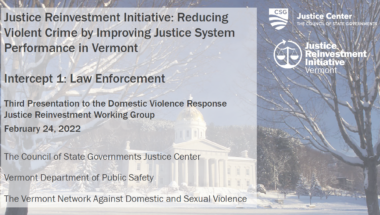
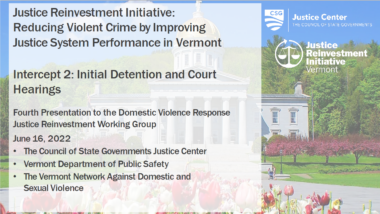
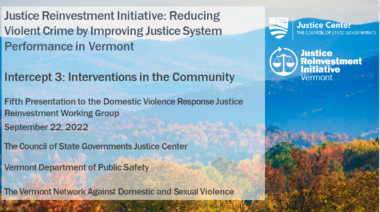
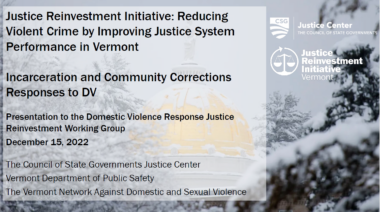
About the author

Arkansas policymakers have long expressed concerns about the state’s high recidivism rate. Over the past 10 years, an…
Read MoreIn April 2025, Arkansas Governor Sarah Huckabee Sanders signed a package of bipartisan criminal justice legislation into law,…
Read More Explainer: Key Findings and Options from Arkansas’s Justice Reinvestment Initiative
Explainer: Key Findings and Options from Arkansas’s Justice Reinvestment Initiative
Arkansas policymakers have long expressed concerns about the state’s high recidivism rate. Over the past 10 years, an estimated 72 percent of prison admissions in the state involved people who were revoked from supervision, with unmet substance use and mental health challenges playing a significant role in these failures.
Read More Explainer: How a New Law in Arkansas Tackles Crime, Recidivism, and Community Supervision Challenges
Explainer: How a New Law in Arkansas Tackles Crime, Recidivism, and Community Supervision Challenges
In April 2025, Arkansas Governor Sarah Huckabee Sanders signed a package of bipartisan criminal justice legislation into law, which is designed to increase public safety and improve community supervision. The legislation passed nearly unanimously.
Read More










